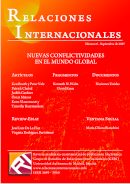Southern Sudan: dynamics, uncertainties and threats in the ongoing post-war era
Keywords:
Africa, Sudan, peace agreement, decolonization, conflicts, ethnicism, religionCopyright (c) 2007 Óscar MATEOS

This work is licensed under a Creative Commons Attribution-NonCommercial-NoDerivatives 4.0 International License.
Abstract
Conflicts in southern Sudan, since 1956, have been as bloody as misinterpreted by international actors. The current post-war process, after the agreements reached in 2005 (Comprehensive Peace Agreement), is stuck between the reactionary policies of Khartum and the divisions between the plethora of diverse ethnic and religious groups behind the armed ‘rebels’. The ‘Sudanese wars’ stand as a paradigm of the so called ‘African postcolonial conflicts’ (and of the contradictions of the Nation-state inherited from the western colonization), and seem to have reached an impasse of unforeseeable consequences. The doubts about DDR in southern areas (Disarmament, Demobilization and Reintegration) come from the very internal instability in the East (Darfur) and in the whole region (Chad, D.R. of Congo, Central African Republic). This article analyses in depth the political, economical, sociological and historical dynamics (‘north – south’ and ‘south – south’ cleavages in precolonial and colonial Sudan) shaping such a complex background.





